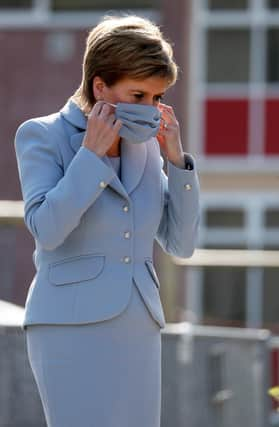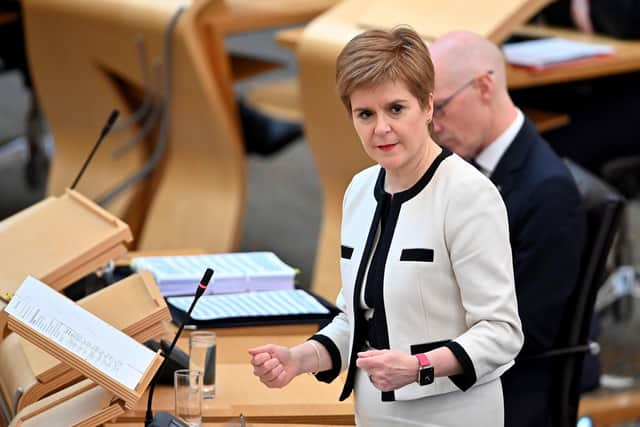The clock may be ticking on the era of Sturgeonism - Euan McColm


After 14 years in government, including seven as First Minister, Sturgeon’s brand remains hugely popular. It is sometimes difficult to imagine circumstances under which she might lose an election.
Not only does Sturgeon’s personal stock remain high, she has more power than any of her predecessors. A recent shake up of the devolution settlement hands the Scottish Government authority in a number of areas, including benefits.
Advertisement
Hide AdAdvertisement
Hide AdSturgeon dominates Scottish politics, completely. And she frequently makes it look easy.


But for all her success, the First Minister remains unable to deliver her key policy. No matter how much energy the SNP expends on the matter, the fact remains that Sturgeon has no power to establish a second referendum.
Relentless nationalist spin has it that the First Minister will establish another vote on the constitution in the second half of the current parliament but while the authority to run a referendum remains with the UK Government, Sturgeon can’t deliver on that promise.
The First Minister’s referendum dilemma had led some of her supporters to speculate about her long-term plans.
One ally points out that Sturgeon will, at some point in the next couple of years, have to follow through on a threat to force the issue of which government has authority over a referendum into the courts. The SNP fully expects such a legal challenge would fail, pushing the prospect of a second referendum further down the road.
What then for Sturgeon? Another election which has every chance of producing a continuing stand-off between Holyrood and Westminster?
There is no history of philosophies – comparable the Thatcherism or Blairism – in the SNP. This is hardly surprising. After all, the SNP is frequently willing to switch positions on policies on the basis of whether the cause of independence will be aided. How, in those circumstances, might an enduring, coherent philosophy sustain?
The only ism that have ever mattered to the SNP is nationalism and the party has marched left or right depending on the political wind in order to sustain its independence campaign.
Advertisement
Hide AdAdvertisement
Hide AdOne ally of the First Minister’s argues it’s time to define and protect the idea of “Sturgeonism”. Inevitably, any SNP leader’s political doctrine will be defined, first and foremost, by their approach to achieving independence. There are only two choices available. A leader can take Sturgeon’s path of arguing for another referendum which has the legal blessing of Westminster or they can argue, as some in the SNP do, that a more radical approach is required.
Friends of Sturgeon say not only that it is important her approach to a referendum remains the party’s position until such point as a vote is run but that this this pragmatism should be tied to the SNP’s mission of “social justice”.
“You want to make the argument,” says one supporter of the First Minister, “that the electorate wouldn’t be well served by an illegal referendum which would be boycotted by unionists and produce a meaningless result and at the same time you want to argue for policies that start to look a bit more progressive.
“You want to be saying to supporters, look, actually doing something about child poverty is a more productive use of our time than running a referendum that means nothing.”
When Alex Salmond stepped down as First Minister in 2014, he struck a deal to host a weekly show on the Kremlin’s propaganda TV channel RT – formerly Russia Today. Out of office, Sturgeon would have a far greater number of options than her predecessor. She could easily, says one friend, walk into a senior position in an organisation such as the United Nations or could quickly assemble a portfolio of directorships that would bring huge financial rewards. It’s hard to disagree with that take.
There are trying political times ahead for Sturgeon. Salmond is back on the scene, demanding – on behalf of his Alba Party – that the First Minister act now to secure a referendum. A substantial and vocal minority within the SNP agree that a more radical approach is required.
While firefighting on that front, Sturgeon is under growing pressure over Scotland’s place at the top of the table for drug deaths in Europe. She has promised swift and decisive action on this issue and risks being seriously damaged if success eludes her.
For the first time in a long time, it feels like Sturgeon is dealing with a crisis that has negative implications for her leadership.
Advertisement
Hide AdAdvertisement
Hide AdIt’s hardly surprising that Sturgeon has appeared tired and sometimes tetchy during recent press conferences. She’s been working long hours on the pandemic while the normal to-and-fro of politics rumbles on.
An ally of the First Minister says: “Think about the last couple of years she’s had. She’s had the whole Alex thing. Nightmare. She’s had coronavirus to deal with. Nightmare. You’re not just talking about physical effort. Imagine the emotional drain of all that.”
If Sturgeon is tired of being First Minister, she does an excellent job of disguising the fact. But it is not unreasonable to ask – as some supporters are – how long the SNP can depend on her leadership.
As the age of just 51, Sturgeon has a long career ahead of her. It is not, however, likely that delivering a second referendum will be among her achievements to come.
As we move slowly out of the restrictions imposed to limit transmission of coronavirus, the constitutional question will come back into focus.
Will Nicola Sturgeon, freed of some of the pressures of the pandemic, relish another four years of defending her failure to run another referendum or will the appeal of a life beyond politics grow stronger?
A message from the Editor:
Thank you for reading this article. We're more reliant on your support than ever as the shift in consumer habits brought about by coronavirus impacts our advertisers.
If you haven't already, please consider supporting our trusted, fact-checked journalism by taking out a digital subscription.
Comments
Want to join the conversation? Please or to comment on this article.